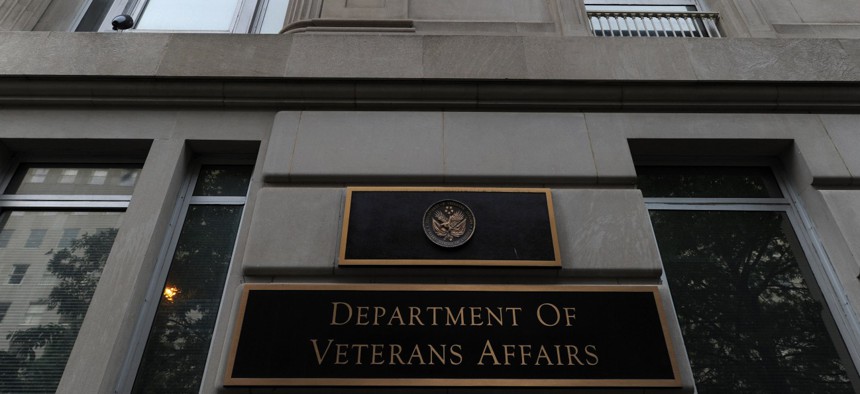
A department spokesman said: “We at VA are committed to working with all of our bargaining partners to deliver for Vets and VA employees alike." Matt McClain/ The Washington Post via Getty Images
VA Claims Progress in Union Talks. The Union Begs to Differ.
AFGE officials say department management continues to push illegal proposals in contract negotiations, and that claims the parties have reached “tentative agreements” are fabricated.
The Veterans Affairs Department this week told reporters about its commitment to collective bargaining following reports that the department again was found to have engaged in bad faith bargaining, noting that labor and management have reached “tentative agreements” at “every bargaining session” over the last year.
“As Secretary McDonough often says, a unionized VA workforce is a strong VA workforce, and we at VA are committed to working with all of our bargaining partners to deliver for Vets and VA employees alike," said VA spokesman Terrance Hayes, on Wednesday. "Bargaining with AFGE on a new master agreement is progressing, the parties are in negotiations this week, and tentative agreements continue to be reached at every bargaining session.”
That came as news to the American Federation of Government Employees, which represents thousands of VA employees. After a years-long battle over how to update AFGE’s collective bargaining agreement with VA during the Trump administration, the parties signed a settlement agreement in 2021 that set up new ground rules to renegotiate the contract. But the parties thus far have failed to reach a deal despite more than a year of negotiations.
“They keep saying that we’re reaching tentative agreements every day, and I don’t know where they’re getting that from,” said Ibidun Roberts, a labor attorney representing AFGE in contract talks with VA management.
Roberts said that in collective bargaining, the term “tentative agreement” is defined in ground rules. And in this case, a tentative agreement can only occur when the parties have reached agreement on an entire contract article.
“When we’ve finished bargaining over the entire article, that’s when we reach a tentative agreement,” she said. “The chief negotiators then must initial each page and then sign the last page. That’s a tentative agreement, and we haven’t reached a single one, so I don’t know what they’re referring to.”
The VA declined to answer questions regarding their definition of “tentative agreement” or a request for examples of what the parties have tentatively agreed to so far.
Last week, an independent arbitrator concluded that VA broke its settlement agreement with AFGE, ignored Federal Labor Relations Authority precedent, and engaged in a series of bad faith bargaining techniques, most notably by proposing—and refusing to negotiate over—a plan to cancel all agreements between VA and AFGE reached at the local level and other memoranda of understanding, which cover issues like parking, telework and work schedules. The arbitrator, among other things, ordered the department to cease engaging in bad faith bargaining and to rescind the offending proposals, including the one governing local agreements.
But Roberts said the decision has not prompted any changes by VA’s negotiators thus far. At the bargaining table this week, management has not rescinded the proposals cited by the arbitrator, and, in fact, one of those proposals has been reintroduced within a different section of the contract.
“So the arbitrator ruled that the proposal to kill local agreements was a permissive subject that they couldn’t bargain to impasse over,” she said. “But this week, they inserted the same proposal into Article 47, which covers midterm bargaining. It’s the same proposal as was in Article 46, but now it’s in 47 . . . Despite the arbitrator’s decision, they are maintaining that they will terminate these local agreements and have no movement on it, meaning they will go to impasse with it.”
VA declined to answer questions about whether it intends to appeal the arbitrator’s decision. Roberts noted that the union still has two other pending grievances awaiting arbitration, this time over the midterm bargaining contract article, as well as management failing to provide information the union says it needs to negotiate over the use of performance improvement plans. The withholding of information was a common negotiation tactic during the Trump administration.
“That’s what makes it so concerning to us,” Roberts said. “We thought that [under President Biden] we would have a different attitude toward bargaining and towards unions. I don’t think we came into this thinking they would give us everything we want—although that would have made things easier—but we thought at least we’d negotiate with someone who saw the value in unions. But now we’re seeing a replay of what we had under the Trump administration: not giving us info, insisting on waivers of our rights or otherwise violating ground rules. Those things that were happening then are still happening now.”
NEXT STORY: Building a Government Leadership Talent Pipeline







